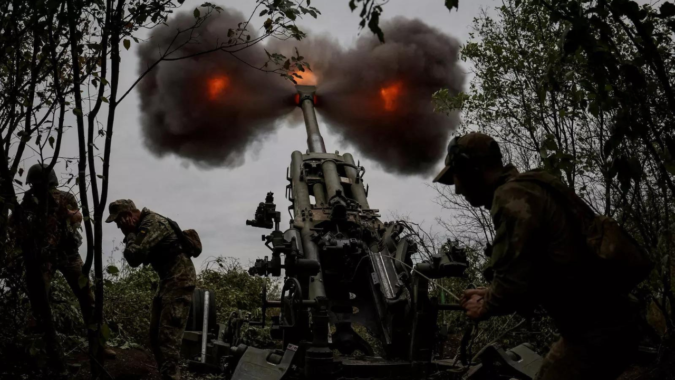GENEVA: Swiss neutrality is more important than ever, President Alain Berset said in an interview published Sunday, defending the controversial ban on transferring Swiss-made arms to Ukraine.
“Swiss weapons must not be used in wars,” he told the NZZ am Sonntag weekly.
The long tradition of neutrality has been hotly debated since Russia’s full-scale invasion of Ukraine in February 2022.
While the wealthy Alpine country, which is not a member of the European Union, has followed the bloc’s lead on sanctions targeting Moscow, it has so far shown less flexibility on its military neutrality.
Despite pressure from Kyiv and its allies, Switzerland has continued to block countries that hold Swiss-made weaponry from re-exporting it to Ukraine.
To date, requests from Germany, Spain and Denmark have ben rejected under the War Materiel Act, which bars all re-export if the recipient country is in an international armed conflict.
Berset told NZZ the policy was based on “commitment to peace, to humanitarian law, to mediation where possible”.
Switzerland’s role as the seat of the International Committee of the Red Cross and the Geneva Conventions, as well as of the United Nations‘s European headquarters “is reflected in our laws, including those relating to the export of weapons”, he said.
Protection of humanitarian and human rights law and the Geneva Conventions “may sound passe to some, but it is more important than ever,” he said, warning it would be “extremely dangerous to throw these fundamental principles overboard now”.
“As far as Switzerland is concerned, warfare is not part of the DNA,” Berset said, stressing his nation aimed “to be present wherever we can contribute to mediation and peace”.
He said he believed negotiations with Russia were needed to end the war in Ukraine, “the sooner the better”.
And he denounced a “war frenzy in certain circles” in Switzerland, amid calls to ditch neutrality.
It “does not mean indifference” and can “adjust”, he said, pointing to “unprecedented sanctions” Switzerland has imposed on Russia.
Several initiatives are under way in parliament towards relaxing the re-export rules to make it possible for Swiss-made weaponry to be transferred by third countries to Ukraine.
But Berset stressed the government’s “position is clear. It also corresponds to my personal position. Swiss weapons must not be used in wars.”
The process towards a final decision, with debates between parliament and the government, followed by a probable referendum under Switzerland’s direct democracy system, is likely to take months.
“Swiss weapons must not be used in wars,” he told the NZZ am Sonntag weekly.
The long tradition of neutrality has been hotly debated since Russia’s full-scale invasion of Ukraine in February 2022.
While the wealthy Alpine country, which is not a member of the European Union, has followed the bloc’s lead on sanctions targeting Moscow, it has so far shown less flexibility on its military neutrality.
Despite pressure from Kyiv and its allies, Switzerland has continued to block countries that hold Swiss-made weaponry from re-exporting it to Ukraine.
To date, requests from Germany, Spain and Denmark have ben rejected under the War Materiel Act, which bars all re-export if the recipient country is in an international armed conflict.
Berset told NZZ the policy was based on “commitment to peace, to humanitarian law, to mediation where possible”.
Switzerland’s role as the seat of the International Committee of the Red Cross and the Geneva Conventions, as well as of the United Nations‘s European headquarters “is reflected in our laws, including those relating to the export of weapons”, he said.
Protection of humanitarian and human rights law and the Geneva Conventions “may sound passe to some, but it is more important than ever,” he said, warning it would be “extremely dangerous to throw these fundamental principles overboard now”.
“As far as Switzerland is concerned, warfare is not part of the DNA,” Berset said, stressing his nation aimed “to be present wherever we can contribute to mediation and peace”.
He said he believed negotiations with Russia were needed to end the war in Ukraine, “the sooner the better”.
And he denounced a “war frenzy in certain circles” in Switzerland, amid calls to ditch neutrality.
It “does not mean indifference” and can “adjust”, he said, pointing to “unprecedented sanctions” Switzerland has imposed on Russia.
Several initiatives are under way in parliament towards relaxing the re-export rules to make it possible for Swiss-made weaponry to be transferred by third countries to Ukraine.
But Berset stressed the government’s “position is clear. It also corresponds to my personal position. Swiss weapons must not be used in wars.”
The process towards a final decision, with debates between parliament and the government, followed by a probable referendum under Switzerland’s direct democracy system, is likely to take months.
